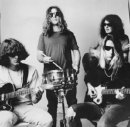Grunge
Users contributing to this page: JanMalysiak
Grunge (sometimes referred to as the Seattle sound) is an alternative rock genre and subculture that emerged during the mid-1980s in the American Pacific Northwest state of Washington, particularly in Seattle and nearby towns. The style became known as a hybrid of punk and metal. The early grunge movement revolved around Seattle's independent record label Sub Pop and the region's underground music scene. The owners of Sub Pop marketed the style shrewdly, encouraging the media to describe it as "grunge". By the early 1990s, its popularity had spread, with grunge bands appearing in California, then emerging in other parts of the United States and in Australia, building strong followings and signing major record deals.
Grunge was commercially successful in the early to mid-1990s, due to releases such as Nirvana's Nevermind, Pearl Jam's Ten, Soundgarden's Badmotorfinger, Alice in Chains' Dirt and Stone Temple Pilots' Core. The success of these bands boosted the popularity of alternative rock and made grunge the most popular form of rock music at the time. Although most grunge bands had disbanded or faded from view by the late 1990s, they influenced modern rock music, as their lyrics brought socially conscious issues into pop culture and added introspection and an exploration of what it means to be true to oneself. Grunge was also an influence on later genres such as post-grunge (such as Creed and Nickelback) and nu metal such as Korn, Limp Bizkit and Slipknot.
Grunge fuses elements of punk rock and heavy metal, featuring the distorted electric guitar sound used in both genres, although some bands performed with more emphasis on one or the other. Like these genres, grunge typically uses electric guitar, bass guitar, drums and vocals. Grunge also incorporates influences from indie rock bands such as Sonic Youth. Lyrics are typically angst-filled and introspective, often addressing themes such as social alienation, self-doubt, abuse, neglect, betrayal, social and emotional isolation, psychological trauma and a desire for freedom.
A number of factors contributed to grunge's decline in prominence. During the mid-to-late 1990s, many grunge bands broke up or became less visible. Nirvana's Kurt Cobain, labeled by Time as "the John Lennon of the swinging Northwest," appeared unusually tortured by success and struggled with an addiction to heroin before his death at the age of 27 in 1994.
-
Hole
-
 United States
United States
- 1989-2002, 2009-2012
-
-
Foo Fighters
-
 United States
United States
- 1994-present
-
-
Mudhoney
-
 United States
United States
- 1988-present
-
-
Sonic Youth
-
 United States
United States
- 1981-2011
-
-
Alice in Chains
-
 United States
United States
- 1987-2002, 2005-present
-





